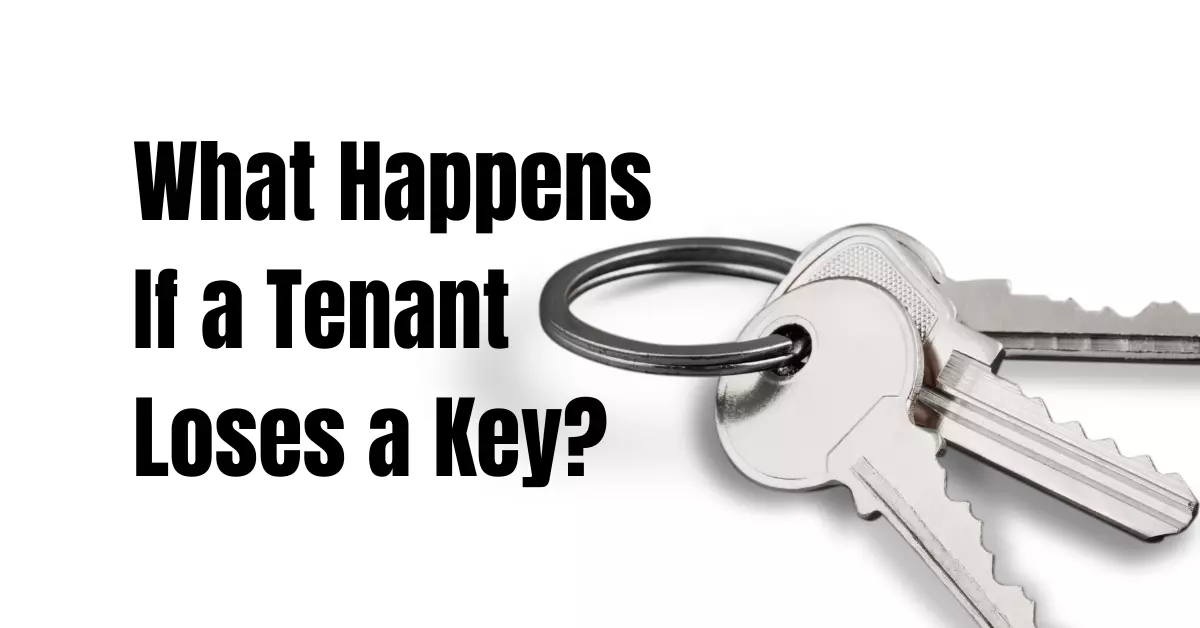What Happens If a Tenant Loses a Key? Rental Awareness
If a tenant loses a key, they may be responsible for covering the costs associated with replacing the key and changing the locks. Landlords typically require tenants to return all keys at the end of the lease or may charge a fee for the replacement of lost keys.
In addition to the cost of replacing lost keys, tenants may also be responsible for any damages resulting from lost or stolen keys.
It is advisable for tenants to maintain a duplicate key or share one with a trusted friend or family member for emergencies.

Legal And Financial Liability For Tenant
Losing keys is a common problem that can occur to anyone, including tenants. Losing a key can be stressful, especially if it is the only key to a rental property.
Losing a key can also have legal and financial implications that tenants need to be aware of.
Losing a key can cost tenants more than just the fee to replace it. Depending on the situation, tenants could be held liable for damages if someone else gains access to the rental property using the lost key.
Here are some important points to keep in mind:
- Tenants are responsible for securing the rental property and ensuring that the keys are not lost or misplaced.
- If someone uses a lost key to break into the rental property and vandalizes it, the tenant could be held responsible for the damages.
- Tenants may also be required to pay for the cost of replacing the locks if the landlord deems it necessary, especially if the rental property is part of a larger complex or building.
- It is important for tenants to review their lease agreements to understand their legal and financial obligations if they lose a key.
Potential Fees For Lock Replacement And Key Duplication
Losing a key can be an expensive inconvenience since tenants may be required to pay fees for lock replacement and key duplication. These fees can vary depending on the landlord or rental company and the type of key or lock.
Here are some potential fees that tenants might expect:
Lock replacement fee
If the locks in the rental property need to be replaced due to a lost key, the tenant may be responsible for paying this fee.
The cost can range from a few hundred to thousands of dollars, especially if the locks are high-security or require specialized installation.
Key duplication fee
If the landlord provides an extra key, the tenant may be required to pay for it. The cost may depend on the type of key, the locksmith, or the landlord’s policies.
Landlord’S Responsibilities And Rights In The Scenario
Landlords have certain responsibilities and rights when tenants lose keys to the rental property. Here are a few things landlords may do in this scenario:

Rekey the locks
To ensure the security of the rental property, some landlords may choose to rekey the locks if a key is lost. This can be costly, and landlords may pass the expense onto the tenant.
Provide extra keys
Depending on the landlord’s policies, they may provide an extra key or set of keys to the tenant.
Access the property
In emergency situations, landlords may have the right to access the rental property without the tenant’s consent, especially if there is a safety concern.
Importance Of Tenant-Landlord Communication And Documentation
Communication and documentation are important aspects of managing rental properties.
When a tenant loses a key, it is important to document the situation and communicate effectively with the landlord.
Here are some tips for tenant-landlord communication and documentation:
- Report the lost key immediately: Tenants should report the lost key as soon as it happens. This can help minimize the potential for damages and expenses.
- Notify the landlord in writing: Tenants should notify their landlord in writing and document the notification for future reference.
- Keep copies of lease agreements: Tenants should keep copies of their lease agreements to understand their legal and financial responsibilities if they lose a key.
- Be responsive: Tenants should respond promptly to their landlord’s requests and provide any necessary information or documentation.
Risks Associated With Lost Keys
Losing a key may seem like a minor inconvenience, but it can have potentially severe consequences for the tenant and other occupants of the property. Here are some of the risks associated with lost keys:

Risk Of Unauthorized Access To The Property
When a tenant loses a key, there is a risk that an unauthorized person may find and use it to gain access to the property.
This could include individuals who intend to commit theft or vandalism. Not only could this result in damage to the property, but it could also put the safety of the tenant and other occupants at risk.
To mitigate this risk, tenants should inform their landlord or property manager immediately if they lose a key. The lock can be changed quickly, ensuring that anyone who had the lost key can no longer gain access to the property.
Risks To The Property And Personal Belongings
If an unauthorized person gains access to the property using a lost key, they may cause damage to the property or steal the tenant’s personal belongings.
This could include expensive items such as electronics, jewelry, or other valuables. In addition to the financial cost of repairing or replacing items, the tenant may also experience emotional distress as a result of the loss.
To prevent this risk, tenants should take precautions to keep their keys safe and secure. They should avoid leaving it in obvious places, such as on a key hook or in a visible location near the door.
Additionally, tenants should consider installing a security system to help prevent unauthorized access.

Risks To Personal Safety Of Tenant And Other Occupants
In addition to the risk of property damage or theft, losing a key could also put the personal safety of the tenant and other occupants at risk.
If an unauthorized person gains access to the property, they may pose a threat to the safety of the occupants.
This could include physical harm, harassment, or other forms of violence.
To minimize this risk, tenants should take steps to ensure that the property is secure. This may include installing a security system, locking doors and windows, and ensuring that the property is well-lit and visible from the street.
Additionally, tenants should be aware of their surroundings and report any suspicious activity to law enforcement immediately.
Losing a key can have serious consequences for tenants and other occupants of the property.
To ensure the safety and security of everyone involved, it is important to take precautions to prevent unauthorized access, protect property and belongings, and maintain personal safety.
Frequently Asked Questions Of What Happens If A Tenant Loses A Key
What Should A Tenant Do If They Lose Their Key?
The tenant should inform the landlord immediately and verify the method of key replacement.
Who Is Responsible For Key Replacement If The Tenant Loses Their Key?
The tenant is responsible for the cost of key replacement unless otherwise stated in the lease agreement.
Can A Landlord Change The Locks If A Tenant Loses A Key?
Yes, a landlord can change the locks but must provide proper notice to the tenant beforehand.
What Can A Tenant Do To Avoid Losing Their Key?
A tenant can make spare copies and keep them in a safe place, or install a keyless entry system for added security.
Conclusion
Losing a tenant key isn’t a small hiccup, it could mean compromised security for your space. Always communicate with your landlord promptly to get a replacement.
Remember, you might have to bear the cost but it’s a small price to ensure your safety and peace of mind.
Reference
https://www.gov.mb.ca/cca/rtb/ot/gbook/s3privacy_keys2.html